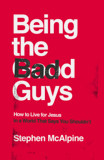
Freedom and human dignity are kingdom concepts. These ideas are grounded in the Bible. They formed the basis of the Christian movement—a movement that swept the world. And they are highly attractive and compelling.
Everyone wants the fruit of these ideas. But the root of these ideas? Not so much.
Mark Sayers, the author of Reappearing Church, says that our progressive culture seeks the “kingdom without the King”. The cultural ambition is to replicate the kingdom vision of the good life—a future world of human rights, dignity, freedom, love and equality—but all without Jesus at the centre. And, frustratingly for those among us who may wish to see the whole thing come crashing down in order to prove how right we are, this vision appears to be progressing quite well. At least on the surface.
Equality and diversity programs are par for the course in large corporations. Freedom for sexual minorities is celebrated by secularists everywhere. Emancipation for every marginalised group is showcased across social media.
"We have become the source of meaning—our own meaning—and we only let people into our lives if they affirm and confirm our self-appointed True North."
Meanwhile the church is presented as curmudgeonly, grumpy and downright angry that it is no longer running the freedom-and-joy programme. Yet while the King has been removed from the kingdom programme, the throne has not been vacated. It has been usurped. Who by? Me. You. The individual is now enthroned in this new kingdom.
Politics professor Dale Kuehne has labelled the late modern West the “iWorld”. In the traditional world, or “tWorld”, our understanding of ourselves and our place in the world was discovered through “relationships of obligation”.
Society was held together by a recognition that family relationship structures and a commitment to maintaining them—sometimes at personal cost to the individual—was the pathway to flourishing. By contrast, the iWorld locates meaning and purpose within the individual, and relationships of obligation have been replaced by “relationships of choice”.

How we came to live in a post-Christian culture and how to live for Jesus in it.
Our compass for who we are is not pointed outwards but inwards. We have become the source of meaning—our own meaning—and we only let people into our lives if they affirm and confirm our self-appointed True North.
I cannot emphasise enough how important this shift in how we view relationships is—nor how long it has been in the making. Although it seems just yesterday that we were being told to adopt pronouns that we’d never heard of, the roots of this individual enthronement first grew in the soil of the Enlightenment, several hundred years ago. What we are experiencing today is not the sudden discovery of a new way of looking at the world but the final flowering of a view of humanity that began long before the word “cisgender” ever made it to the Humanities departments of our universities.
Canadian philosopher Charles Taylor, in A Secular Age, calls this “the age of authenticity”—an age which traces its roots back through the sexual revolution, past the post-war boom, all the way to the Romantic period that began in the late eighteenth century.
Poets such as William Wordsworth and Lord Byron valued expressive individualism and a deep trust in one’s emotional responses. It was untamed nature that they saw as authentic, contrasting it with the soul-destroying strictures of modern life and institutions.
In our own age, authenticity is defined by how true you are to yourself. Not how true you are to your calling, or your community, or your covenant relationships, but to yourself. This authenticity search has taken on dazzling speed and reached its zenith.
Clearly, the Bible reveals we have a better gospel. It is a gospel which can transform us far more deeply, securely and satisfactorily than any surface work; a gospel of forgiveness and love and acceptance that does not reside in how we feel about our identities.
The question for Christians is: How do we meet these challenges? Do we have the tools and the know-how to counter this rival gospel, or will we be swept away with the rest of the cultural foundation stones that once seemed so secure?
This is an extract from Being the Bad Guys by Stephen McAlpine, which offers an analysis of how our culture ended up this way and explains key points of tension between biblical Christianity and secular culture.